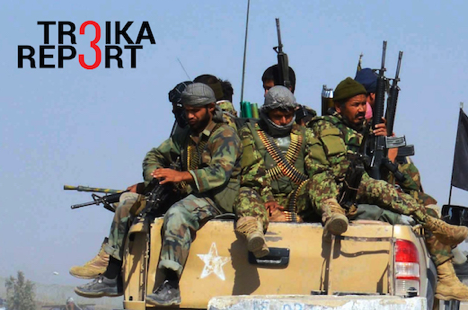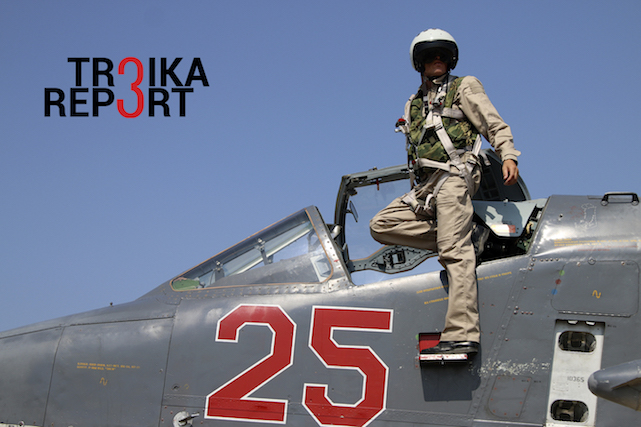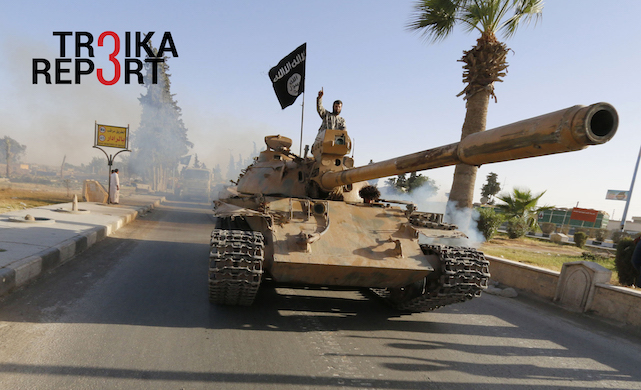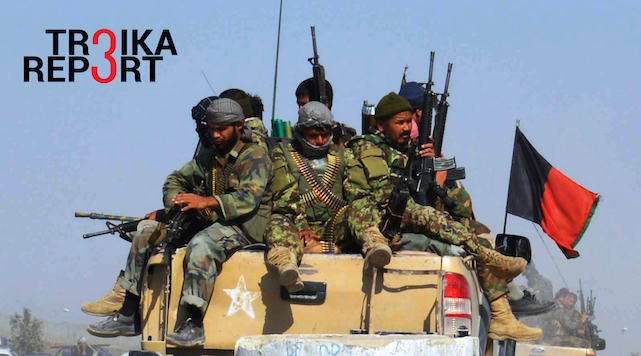TROIKA REPORT: Is there a Taliban-ISIS double threat to Russia?

1. Russia’s double track: Escaping the impasse on Ukraine and Syria
 In this photo taken on Saturday, Oct. 3, 2015, Russian army pilot poses at a cockpit of SU-25M jet fighter at Hmeimim airbase in Syria. Source: AP Photo/Alexander Kots, Komsomolskaya Pravda
In this photo taken on Saturday, Oct. 3, 2015, Russian army pilot poses at a cockpit of SU-25M jet fighter at Hmeimim airbase in Syria. Source: AP Photo/Alexander Kots, Komsomolskaya Pravda
Russia’s air strikes on what it says are ISIS targets inside Syria have raised the stakes in Moscow’s policy of engaging the West in what it claims is a joint fight against Islamic terrorists. The move has also sent confusing signals over the possibility of re-engaging the West in multi-faceted cooperation, from political dialogue to trade, a partnership ruptured by the war of sanctions over Moscow’s role in the Ukraine conflict.
However, the heating up of the situation in Syria comes at the same time as the cooling of hostilities in Eastern Ukraine, which appears to be the product of concerted diplomatic efforts by the leaders of Ukraine, Germany, France and Russia to ensure the implementation of the Minsk peace accords signed back in February.
The summit of the four nations, which took place in Paris at the end of last week, was remarkably devoid of name-and-blame rhetoric, with few if any accusations targeting Moscow as the apparent protector of the self-proclaimed republics of Donetsk and Lugansk.
The discourse of the four leaders could be summed up in two observations: “None of the articles of Minsk have been respected completely” (Angela Merkel) and the admission that some progress has been made on the military aspects of the Minsk accords (Francois Hollande).
But the key message of the Paris summit hangs on the premise that there is no sign of advancement on the crucial element of the agreement, political reform. In essence, the reforms amount to amending the Ukrainian constitution to accommodate the insistence of Donetsk and Lugansk on a special status with guarantees of the observance of human rights, e.g. the rights of ethnic – Russian –minorities.
Besides, Germany and France have said the timeline for the implementation of the Minsk agreements can be extended, which gives all sides a little more breathing space.
The link between the cautious progress on the Ukrainian front and Russia’s air strikes on targets in Syria is found in the roots of the refugee deluge flooding Europe. The sudden surge of thousands of frustrated Syrian and Iraqi citizens is a result of the crumbling security environment and law and order in these two countries, which now see one third of their territories under the control of militants from the Islamic State (ISIS) radical group.
Are there any chances that putting the Donbass crisis on the back burner and achieving a modest military success in Syria could set the stage for a more meaningful cooperation with some Western powers? This is dismissed as wishful thinking by Vladimir Bruter, an expert from the Moscow-based International Institute of Humanitarian and Political Studies, who spoke to Troika Report:
“It’s a premature even to consider such an option. The softer approach to the Syrian crisis by the continental European powers is not matched by their role in decision-making. The stance certain governments in Europe will take is conditional on the preliminary results of the Russian military operation in Syria.
“If the results are positive, it will be taken into account in Europe. If the operation does not bear fruit in the near future, and becomes a protracted campaign, there will hardly be any changes in the foreign policy of European nations, with the likelihood that it will lean towards more rigidness, yet relative rigidness.
“As for the United States, its position on the Ukrainian crisis is not likely to change at all, not in an election year, and will still amount to ‘keeping it burning’ while not inflaming it more.
“In more general terms, the Paris summit has shown that Germany, France and Russia prefer to freeze the conflict in Eastern Ukraine so that it will not have the potential to erupt into hostilities. For Germany in particular, the refugee influx is of paramount importance and pushes the Ukrainian issue to the sidelines.”
Supposedly, the discrepancy in the approach of the Anglo-Saxon nations and continental Europe is due to the way the Syrian crisis affects their interests. Might this help to precipitate the dismantling of the EU sanctions regime and abandonment of attempts to isolate Russia on the Western front, at least in Europe? Political analyst and public figure Sergei Stankevich, a senior expert with the Anatoly Sobchak Foundation, provided his view for Troika Report:
“If Russia shows readiness for a full political settlement in Syria, the West could accept her as a partner in this respect. If Russia limits its activity to military strikes, neglecting political dialogue, I’m afraid it could bring more tension in Russia-West relations.”
— If we witness, hopefully, some positive moves leading to normalization in Ukraine, meaning around the Donbass, and the weakening of ISIS in Syria as a result of Russia’s military actions, could we expect the re-emergence of areas of cooperation with the West?
“Definitely. Two problems connected with the Ukrainian crisis were resolved at the Paris meeting: The Minsk agreements will not expire and will be in force for the next year, and the elections scheduled by separatists in Donetsk and Lugansk will not take place. The elections will be held only on the basis of a special law that President Poroshenko must now press through his parliament.”
“The next year we might see a “de-escalation” of sanctions against Russia.”
Moscow’s double-track policy seems to be aimed at slowly pressing for a political settlement in Ukraine by making the central authorities in Kiev start talking directly to the insurgents in the Donbass, and concurrently setting the stage for a similar conclusion of the civil war in Syria, but with preservation of the Alawite regime in Damascus, with Bashar al-Assad at its head or not.
However, on the Syrian track, Moscow’s offer to form a wide coalition was not welcomed. It looks like the West finds itself at the same initial stage as it was in April 2014, when the Ukrainian army launched its offensive against the self-proclaimed republics in the Donbass. At that time, the Minsk agreements and, in general, cooperation between Berlin, Paris and Moscow was still a distant prospect.
Nevertheless, the two conflicts, Eastern Ukraine and Syria, despite their apparent differences, offer Moscow’s diplomacy a chance to engage the West. Whether this gamble succeed or not is the multi-billion dollar question.
2. Two coalitions against ISIS: What next for Syria?
 Militant Islamist fighters on a tank take part in a military parade along the streets of northern Raqqa province June 30, 2014. Source: Reuters.
Militant Islamist fighters on a tank take part in a military parade along the streets of northern Raqqa province June 30, 2014. Source: Reuters.
Despite a barrage of Western criticism over Russia’s attacks, which are allegedly targeting the Syrian opposition instead of ISIS, Russia’s military officials and observers insist the air strikes are proving effective so far.
In the face of such a decisive move by Russia, U.S. President Barack Obama announced a strategic plan to launch a general offensive on the de facto capital of ISIS, the north-eastern Syrian city of Raqqa. The operation would involve deploying 20,000 Kurdish fighters and some 5,000 rebels representing the Syrian opposition, and be backed up with U.S. Air Force support.
Obama’s initiative to launch major offensive on ISIS positions in Syria, not attempted during more than a year of the existence of the U.S.-led coalition, has merely aggravated the rift between Moscow and Washington over the strategy of fighting ISIS. There are suspicions among Russian observers that the plan could be nothing more than a show of resolve and competence for the sake of “not being outdone” by the Russians.
Meanwhile, the second anti-ISIS coalition-in-the-making, comprising Russia, Iran, and Iraq along with Damascus, is showing its own resolve to emerge as a new force against ISIS. The new coalition is setting up a coordination center in Baghdad to carry out reconnaissance and analysis, with the unit due to begin operation in the coming weeks.
A newcomer to the second anti-ISIS coalition, led by Moscow, Iraq is making bold commitments. Seen as a U.S. client-state after more than a decade of American military presence in the country since the demise of dictator Saddam Hussein, Iraq has pledged to become more active in fighting ISIS and provide intelligence data to Iran, Syria, and Russia.
Meanwhile, the international reaction to Russia’s military actions ranges from total rejection (Saudi Arabia and Turkey) to cautious admittance of possible cooperation (France) and an attitude of benign neglect (the United Arab Emirates).
Unexpectedly, the Emirates welcomed Russian involvement, saying that they had no reservations about it. A senior official in Abu Dhabi, quoted by French daily Le Figaro, said if the Russians manage to weaken the ISIS and al-Nusra radical groups, it would be considered by the UAE as “positive.” Moreover, the country are not even concerned if Russia’s steps end up prolonging the rule of Bashar al-Assad: “We have no problem in cooperating with Russia,” said the unnamed official, “but not with Iran.”
On the whole, since Moscow got involved in the Syrian conflict the changes in the configuration of political alliances and loyalties have accelerated. Still, this does not pave the way for a truly wide and comprehensive alliance.
The two anti-ISIS coalitions are not entirely on speaking terms, despite top-level liaison between Russian and American military officials. There is enough rhetoric in the air to suggest that the two alliances are in competition with each other, each de facto claiming supreme legitimacy as the principal anti-ISIS force.
Could this vanity fair hamper the fight against ISIS and other radicals that are jeopardizing regional stability? Dmitry Polikanov, member of the board of the Moscow-based Center for Policy Studies in Russia, an independent think tank, provided a comment for Troika Report.
“It could lead to uncoordinated efforts and, moreover, to clashes between members of different coalitions — not deliberately but unintentionally. I assume that it would be better for both coalitions to have a pact preventing harm being inflicted upon one another. Russia and the U.S. should have an agreement to make their actions more… wise, I would say.
“Right now, Barack Obama has proclaimed the necessity to provide more weapons to the Syrian rebels. As we know, recently such armaments were transferred from the rebels to the terrorist groups; this would eventually hamper the operations conducted by Russia.”
— ISIS is identified as a global threat, as a global challenge. It requires global efforts to eradicate this danger. Why is there no coordination between Russia and the West at this critical point?
“This is due to the lack of political will on the part of the West. The Russian government has repeatedly called on joint efforts to combat Islamic State. All attempts have failed, unfortunately. It could be motivated by the personal ambitions of certain leaders.”
— Can at some point in time one of the coalitions proclaim itself the winner?
“Actually, there can barely be a winner in this war. It would be dangerous to claim to be the victor. ISIS, like many other terrorist organizations, is a network organization. It is practically impossible to achieve complete victory. I think it would be more reasonable to speak about the process but not the result. The goal of Russia and its allies and the U.S.-led coalition should be to minimize the combat potential of ISIS.”
Basically, the undeclared competition between the two coalitions will determine not so much the winner over ISIS but the new pecking order in the region.
For the United States it is becoming a matter of re-instating its credentials as the time-honored provider of security for the Middle East. For Russia, it is about securing a pro-Moscow regime in Damascus, establishing privileged relations with the rising regional power, Iran, and also coming back into global politics as an assertive agent to be reckoned with.
Despite this drastic discrepancy in strategic interests, the over-arching goal for both is evident: ISIS has no place in the civilized world.
3. Is there a Taliban-ISIS double threat to Russia and Central Asia?
 Afghan government forces in the city of Kunduz, October 5, 2015. Source: Zuma / TASS
Afghan government forces in the city of Kunduz, October 5, 2015. Source: Zuma / TASS
The sudden deterioration of the regional security environment prompted Tajik President Emomali Rahmon to fly urgently to Sochi to meet Russian leader Vladimir Putin and discuss, among other things, the strengthening of “bilateral military-technical cooperation” and additional effective measures to make the southern border with Afghanistan as impregnable as possible.
Meanwhile, Ramzan Kadyrov, leader of Russia’s Chechen Republic, met with Afghan Vice President Abdul Rashid Dostum. After the meeting Kadyrov voiced the opinion that Russia should provide substantial assistance to Afghanistan in blocking the advance of the Islamic State (ISIS) radical militant group, which is now targeting this region too.
However, Moscow-based experts with a career in security services, diplomacy and academic studies have conflicting views on the likelihood of Russia’s readiness to go one step further than its current pre-emptive preparations and get directly involved in assisting the Afghan government to fight off the Islamist militants. There is also no consensus on the level of security threat to Russia and Central Asia from the expansion of ISIS jihadists’ outreach to Afghanistan.
So how serious is the threat of the Taliban consolidating control of an area in the vicinity of Russia’s Central Asian allies? Alexei Malashenko, a security expert at Moscow's Carnegie Center, claims the danger is being exaggerated.
“I think it is no threat to Russia. Moreover, it is no threat to Tajikistan as well; its real challenges are coming from within the country. I do not envisage the Taliban attacking Tajikistan; they do not have the force to do it.”
“The Taliban is preoccupied with its own, domestic, Afghan affairs.”
However, this opinion is disputed by another expert. Troika Report approached General Vyacheslav Trubnikov, former First Deputy Minister of Foreign Affairs, former Director of the Russian Foreign Intelligence Service, and former ambassador to Afghanistan, for his insight into the matter. Should the recent victories by the Taliban convince and persuade Moscow that it is better to act pro-actively than retro-actively by enhancing security along Central Asian borders?
“My personal opinion is that the situation in Afghanistan has never been calm or stable. Russia and its allies under the auspices of the Collective Security Treaty Organisation (CSTO) are well aware of these dangerous developments inside Afghanistan. The recent CSTO summit paid due attention to these developments. It is essential for all the CSTO member states to be always on the alert.
“I do not think there is a direct link between Islamic State and the Taliban movement. But any terrorist threat, no matter where it comes from, should be responded to with certain pre-emptive actions. Such actions are effective only if they are well coordinated. The meeting of CSTO members was a step in the right direction.”
— Given the air strikes currently being carried out by Russia in Syria, is there a possibility that a similar operation could be undertaken in Afghanistan?
“Up to now we have not received a request from the Afghan government to enter an agreement specifying collective actions. Unlike in Syria, whose legitimate government requested concrete assistance from Russia.”
In any case, the capture of the strategic city of Kunduz by Taliban fighters, later pushed out by Afghan security forces, marks an escalation of the civil war in a country that has not seen stability for almost 40 years. The Taliban is on the march. What kind of a security threat is the Taliban for Central Asia? Georgy Mirsky, professor at the Higher School of Economics in Moscow and one of Russia’s leading experts on Middle East affairs, had the following to say to Troika Report:
“There are various Islamist organizations — we should not focus only on the Taliban and al-Qaeda — there is Islamic State there and others. They are Sunnis but of different ethnic backgrounds: Arabs, Chechens, Uzbeks, Tajiks, Pashtuns, etc. If there is a rebellion somewhere in Tajikistan, the rebels can reckon on arms supplies from Afghanistan because after NATO forces leave there will be an awful lot of weapons around. Some of these weapons may be transferred by local Tajiks and Uzbeks to underground organizations inside Tajikistan and Uzbekistan.”
— What countermeasures would it make sense for Russia to take in a pro-active mode?
“I met these kinds of people back in 1995, and they told me that their real and ultimate goal will be… Kazakhstan, and then [the Russian republics of] Tatarstan and Bashkiria. They would not achieve this goal. But the point is that they are ready to kill and die for this to happen. Russia should put up a barrier to prevent such incursions.”
The resurgence of the Taliban, after displaying a higher degree of military operational skill during the attack on Kunduz, as well as reports that some of its units are merging with or being subjugated by ISIS militants, adds uncertainty to the fate of Afghan President Ashraf Ghani and to the preservation of a secular regime in Kabul.
The international jihadist forces now assembling in Afghanistan are a destabilizing factor for the entire region. This sounds an alarm bell for Russia and its allies in Central Asia, which sooner or later will force them to undertake pre-emptive action.
All rights reserved by Rossiyskaya Gazeta.
Subscribe
to our newsletter!
Get the week's best stories straight to your inbox